 David Buchanan and Markus Hällgren have their leadership article based on the zombie classic “Day of the Dead” by George Romero published in pre-print. Available at the journal of “Management Learning”. If you´d like a copy drop any of the authors an email.
David Buchanan and Markus Hällgren have their leadership article based on the zombie classic “Day of the Dead” by George Romero published in pre-print. Available at the journal of “Management Learning”. If you´d like a copy drop any of the authors an email.
Abstract
What can the classic zombie movie, Day of the Dead, tell us about leadership? In our analysis of this film, we explore leadership behaviours in an extreme context – a zombie apocalypse where survivors face persistent existential threat. Extreme context research presents methodological challenges, particularly with regard to fieldwork. The use of films as proxy case studies is one way in which to overcome these problems, and for researchers working in an interpretivist perspective, ‘social science fiction’ is increasingly used as a source of inspiration and ideas. The contribution of our analysis concerns highlighting the role of leadership configurations in extreme contexts, an approach not previously addressed in this field, but one that has greater explanatory power than current perspectives. In Day of the Dead, we observe several different configurations – patterns of leadership styles and behaviours – emerging, shifting and overlapping across the phases of the narrative, each with radically different consequences for the group of survivors. These observations suggest a speculative theory of leadership configurations and their implications in extreme contexts, for exploring further, with other methods.
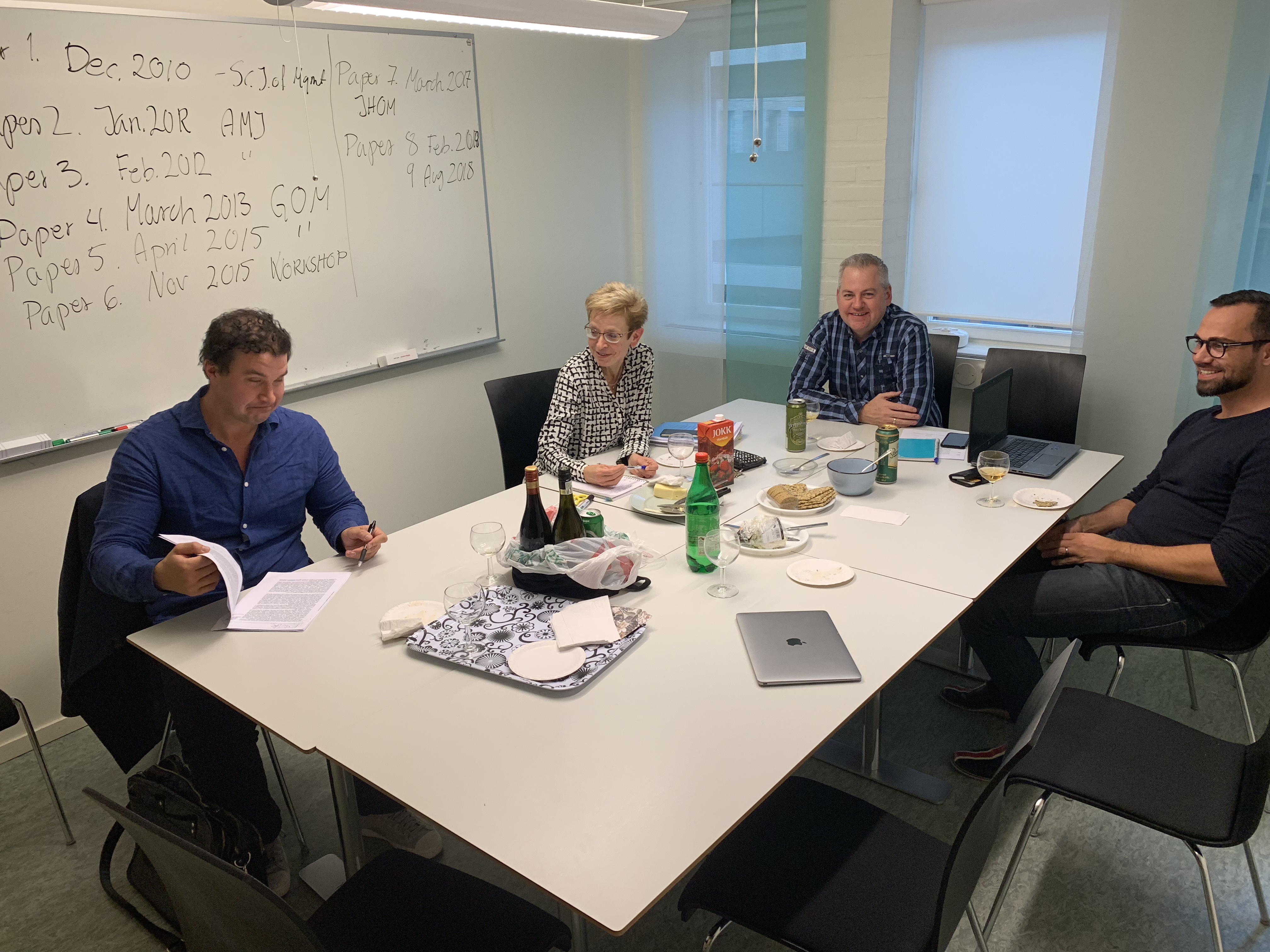 Today we had the pleasure of having the first ODD seminar of the semester. Ulrica told the story about the paper “Multi-professional teamwork in human services: The mutual shaping of professional identity and team activities” (
Today we had the pleasure of having the first ODD seminar of the semester. Ulrica told the story about the paper “Multi-professional teamwork in human services: The mutual shaping of professional identity and team activities” (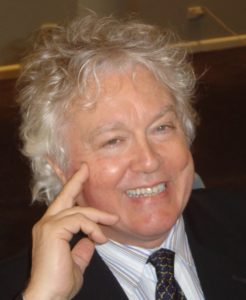 Today Professor Stewart Clegg at UTS, Sidney visited TripleEd and USBE. As part of the activities he gave a talk based on the paper “EMERGENT COORDINATION FAILURES IN FREELANCE IMPROVISATION: LESSONS FROM THE “ROAD OF DEATH”. Unfortunately the paper was so interesting that no photo was taken. The paper is based on a wildfire in Portugal that caught several people at a bad spot, that eventually killed them. The paper is an example of the darkside of improvisation and its consequences.
Today Professor Stewart Clegg at UTS, Sidney visited TripleEd and USBE. As part of the activities he gave a talk based on the paper “EMERGENT COORDINATION FAILURES IN FREELANCE IMPROVISATION: LESSONS FROM THE “ROAD OF DEATH”. Unfortunately the paper was so interesting that no photo was taken. The paper is based on a wildfire in Portugal that caught several people at a bad spot, that eventually killed them. The paper is an example of the darkside of improvisation and its consequences.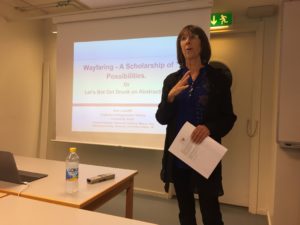 Today Ann gave her second seminar at USBE. This time it was a seminar titled “Wayfaring: A Scholarship of Possibilities. Or Let’s not get drunk on abstraction.” Ann argue that our academic work is becoming increasingly normalized through the gatekeeping activities of journal editors, funding bodies, ranking systems, and so on. This is resulting in a narrowing of scholarship: of methods, of theorizing, and of ways in which we write our accounts. She suggest that one way of addressing this situation is to build a more pluralistic scholarship of possibilities, one that requires us to humanify ourselves and others. Ann draw on anthropologist Tim Ingold’s notion of ‘wayfaring’ as a metaphor for re-thinking how we might conduct our research as a scholarship of possibilities, and suggest this involves foresight, imagination and reflexivity.
Today Ann gave her second seminar at USBE. This time it was a seminar titled “Wayfaring: A Scholarship of Possibilities. Or Let’s not get drunk on abstraction.” Ann argue that our academic work is becoming increasingly normalized through the gatekeeping activities of journal editors, funding bodies, ranking systems, and so on. This is resulting in a narrowing of scholarship: of methods, of theorizing, and of ways in which we write our accounts. She suggest that one way of addressing this situation is to build a more pluralistic scholarship of possibilities, one that requires us to humanify ourselves and others. Ann draw on anthropologist Tim Ingold’s notion of ‘wayfaring’ as a metaphor for re-thinking how we might conduct our research as a scholarship of possibilities, and suggest this involves foresight, imagination and reflexivity. This track will address a major gap in our understanding – organising for resilience in contexts that are abnormal, exceptional, or extreme. This can involve the processes of anticipating, preparing for, responding to and learning from disruptive events in order to survive and prosper.
This track will address a major gap in our understanding – organising for resilience in contexts that are abnormal, exceptional, or extreme. This can involve the processes of anticipating, preparing for, responding to and learning from disruptive events in order to survive and prosper.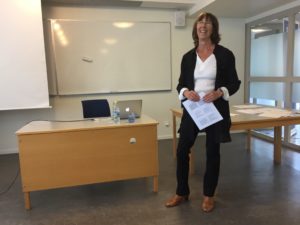 Today we had the pleasure of having Professor Ann Cunliffe giving a seminar on Publishing in top tier journals, specifically how to deal with reviewers’ comments. A number of different take aways but among those the Golden rule of writing: “Tell them what you are going to say—>TELL THEM—>Tell them what you have said”
Today we had the pleasure of having Professor Ann Cunliffe giving a seminar on Publishing in top tier journals, specifically how to deal with reviewers’ comments. A number of different take aways but among those the Golden rule of writing: “Tell them what you are going to say—>TELL THEM—>Tell them what you have said”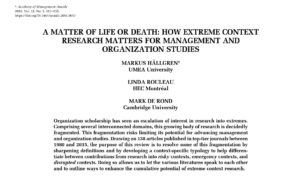 The R3 research group stands for Risk, Resilience and Reliability. It is a newly formed interdisciplinary network that currently is organized by Amy Fraher and Mark Hall at Birmingham University. Markus was invited to present his and Linda Rouleau´s and Mark de Rond´s Annals paper on extreme contexts. It was a great seminar with plenty of interesting thoughts and discussions following presentations by senior and junior scholars alike.
The R3 research group stands for Risk, Resilience and Reliability. It is a newly formed interdisciplinary network that currently is organized by Amy Fraher and Mark Hall at Birmingham University. Markus was invited to present his and Linda Rouleau´s and Mark de Rond´s Annals paper on extreme contexts. It was a great seminar with plenty of interesting thoughts and discussions following presentations by senior and junior scholars alike.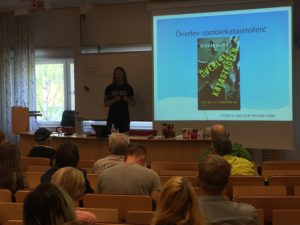 Today I, Markus, had the pleasure of listening to Herman Geijer. The expert on how to survive a zombie infection. Herman has written two books about the phenomena and now is giving talks all over Sweden about how to best prepare. It was a pleasure to listen to him, giving examples that are highly relevant to our behaviors and contemporary examples of disasters, such as 9-11, Hurricane Sandy, Forest fires in Sweden and bridges that breaks and people keep driving off from. I should nuance this slightly, Herman is indeed talking about zombies, but as a metaphor for understanding society´s preparedness level for more common disasters. From a extreme context point of view, it is yet an example of what we can learn when we apply such a empirical lens! Btw, the photo do not show it, but the room was packed!
Today I, Markus, had the pleasure of listening to Herman Geijer. The expert on how to survive a zombie infection. Herman has written two books about the phenomena and now is giving talks all over Sweden about how to best prepare. It was a pleasure to listen to him, giving examples that are highly relevant to our behaviors and contemporary examples of disasters, such as 9-11, Hurricane Sandy, Forest fires in Sweden and bridges that breaks and people keep driving off from. I should nuance this slightly, Herman is indeed talking about zombies, but as a metaphor for understanding society´s preparedness level for more common disasters. From a extreme context point of view, it is yet an example of what we can learn when we apply such a empirical lens! Btw, the photo do not show it, but the room was packed!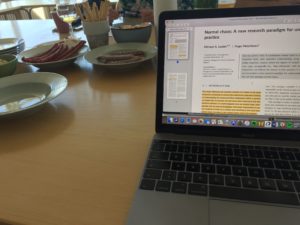 Yesterday Thomas arranged a seminar where we discussed Lauder & Marynissen´s article “Normal chaos: A new research paradigm for understanding practice” published in “Journal of Contingency and Crisis Management”. The conclusions were mixed but one take away is that what they describe is an old, universal problem. The battle between theory in use, and espoused theory if one will. The issue is what to do about this knowledge. That is yet to explore.
Yesterday Thomas arranged a seminar where we discussed Lauder & Marynissen´s article “Normal chaos: A new research paradigm for understanding practice” published in “Journal of Contingency and Crisis Management”. The conclusions were mixed but one take away is that what they describe is an old, universal problem. The battle between theory in use, and espoused theory if one will. The issue is what to do about this knowledge. That is yet to explore. Oscar Rantatalo received a small research grant from Stieg Larsson Foundation (50 000 SEK) for complementary data collection on policing and criminal investigation of domestic violence in rural areas.
Oscar Rantatalo received a small research grant from Stieg Larsson Foundation (50 000 SEK) for complementary data collection on policing and criminal investigation of domestic violence in rural areas.